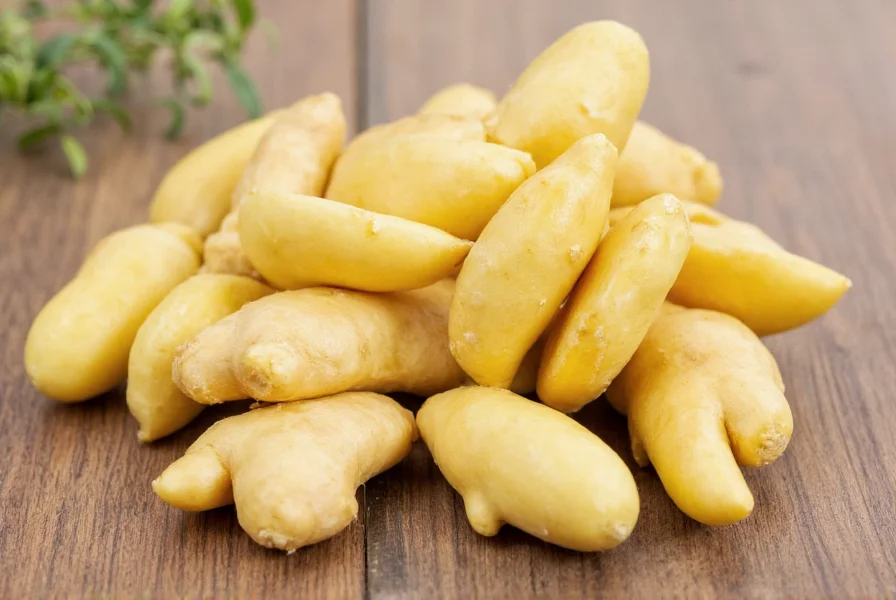For centuries, raw ginger has been valued across global culinary and traditional medicine practices. This rhizome's distinctive pungent flavor and therapeutic properties stem from its complex chemical composition, particularly the presence of gingerols and shogaols. Unlike processed forms, fresh ginger retains maximum enzymatic activity and volatile compounds that deliver superior health benefits.
Nutritional Composition of Raw Ginger
Raw ginger's therapeutic value comes from its unique phytochemical profile. The following table details key components found in 100 grams of fresh ginger root:
| Nutrient/Compound | Amount | Significance |
|---|---|---|
| Gingerols | 0.5-3.0% | Primary anti-inflammatory compounds |
| Vitamin C | 5 mg | Antioxidant support |
| Magnesium | 43 mg | Muscle and nerve function |
| Dietary Fiber | 2 g | Digestive health support |
| Zinc | 0.34 mg | Immune system support |
Science-Backed Health Benefits of Raw Ginger
Multiple clinical studies confirm specific therapeutic applications of consuming raw ginger. The most well-documented benefits include:
Nausea and Digestive Support
Raw ginger demonstrates significant effectiveness against various forms of nausea. Research published in the Journal of the American Medical Association found that 1 gram of raw ginger reduced chemotherapy-induced nausea by 40% compared to placebo. Pregnant women experiencing morning sickness often find relief with 1-1.5 grams of fresh ginger daily. The mechanism involves ginger's ability to accelerate gastric emptying and modulate serotonin receptors in the digestive tract.
Inflammation Reduction
The gingerols in raw ginger inhibit inflammatory pathways similar to non-steroidal anti-inflammatory drugs (NSAIDs), but without the gastrointestinal side effects. A 2021 study in Arthritis Research & Therapy showed that participants consuming 2 grams of raw ginger daily experienced 30% greater reduction in osteoarthritis pain compared to the control group after 12 weeks.
Antioxidant Protection
Raw ginger contains potent antioxidants that combat oxidative stress. Unlike cooked ginger, fresh ginger maintains higher levels of enzymatic antioxidants that help neutralize free radicals. Regular consumption supports cellular health and may reduce long-term risk of chronic diseases.

Culinary Applications of Raw Ginger
Raw ginger's versatility extends beyond medicinal uses into diverse culinary applications. When preparing raw ginger for consumption:
- Peeling technique: Use the edge of a spoon to remove skin without wasting the nutrient-rich layer beneath
- Grating method: Freeze ginger first for easier grating and maximum juice extraction
- Infusion process: Thinly slice for teas to maximize surface area and compound release
Chefs prefer raw ginger in dressings, marinades, and fresh juices where its bright, spicy notes enhance flavor profiles. The enzymatic activity in raw ginger also helps tenderize proteins in marinades more effectively than cooked ginger.
Optimal Consumption Guidelines
Understanding proper raw ginger usage ensures maximum benefit while avoiding potential issues:
Daily Intake Recommendations
Most clinical studies show optimal results with 1-3 grams of raw ginger daily (approximately 1/2 to 1.5 inches of fresh root). Higher amounts may cause gastrointestinal discomfort in sensitive individuals. Those using ginger for specific therapeutic purposes should consult healthcare providers for personalized dosing.
Raw vs. Cooked Ginger Differences
Raw ginger contains higher concentrations of gingerols, while cooking converts these to shogaols which have different bioavailability. Raw ginger provides more immediate digestive benefits, while cooked forms offer longer-lasting anti-inflammatory effects. For nausea relief, raw ginger generally produces faster results.
Storage Methods for Maximum Freshness
Proper storage maintains raw ginger's potency and extends shelf life:
- Refrigerate unpeeled ginger in an airtight container for up to 3 weeks
- Store in a jar of dry sherry in the refrigerator for up to 1 month
- Freeze whole or sliced ginger for up to 6 months (thaw before use)
- Never store ginger in water as this accelerates spoilage
Potential Side Effects and Considerations
While generally safe, raw ginger may cause issues for certain individuals:
- Heartburn or gastric irritation in sensitive individuals, especially when consumed on empty stomach
- Increased bleeding risk when combined with blood-thinning medications
- Lowered blood sugar levels that may affect diabetes management
- Gallstone concerns for those with existing gallbladder disease
Pregnant women should limit intake to 1 gram daily during the first trimester. Those scheduled for surgery should discontinue raw ginger consumption at least one week prior due to potential blood-thinning effects.
Conclusion
Raw ginger represents one of nature's most versatile functional foods with substantial scientific backing for its health-promoting properties. When incorporated appropriately into daily routines, fresh ginger provides digestive support, inflammation reduction, and antioxidant protection. Understanding proper selection, preparation, and consumption methods ensures users maximize benefits while minimizing potential side effects. As with any natural remedy, consistency and appropriate dosing yield the best results for long-term health maintenance.
Frequently Asked Questions
Can you eat raw ginger every day?
Yes, consuming 1-3 grams of raw ginger daily is generally safe for most adults. This amount provides therapeutic benefits without significant side effects. Long-term daily consumption within these limits shows positive health outcomes in clinical studies, particularly for digestive health and inflammation management.
How much raw ginger should I take for nausea relief?
For nausea relief, research indicates that 1-1.5 grams of raw ginger (approximately 1/2 inch of fresh root) provides effective relief within 30-60 minutes. Pregnant women experiencing morning sickness typically benefit from 1 gram daily, while those with motion sickness may take 1 gram 30 minutes before travel.
What's the difference between raw ginger and dried ginger powder?
Raw ginger contains higher levels of gingerols and active enzymes that provide immediate digestive benefits. Dried ginger powder has converted more gingerols to shogaols through the drying process, resulting in stronger anti-inflammatory effects but less immediate digestive action. Raw ginger generally offers more potent nausea relief, while dried ginger provides longer-lasting systemic benefits.
Does raw ginger interact with medications?
Raw ginger may interact with blood-thinning medications like warfarin due to its mild anticoagulant properties. It can also enhance the effects of diabetes medications by lowering blood sugar. Those taking hypertension medications should monitor blood pressure as ginger may amplify these effects. Always consult your healthcare provider about potential interactions with your specific medications.
How long does raw ginger stay fresh?
Whole raw ginger root stays fresh for 3-4 weeks when stored properly in the refrigerator in an airtight container. Once peeled, it lasts about 1 week. Frozen ginger maintains quality for up to 6 months. Signs of spoilage include soft spots, mold growth, or a sour smell. Always discard ginger that shows these signs as it may contain harmful bacteria.











 浙公网安备
33010002000092号
浙公网安备
33010002000092号 浙B2-20120091-4
浙B2-20120091-4